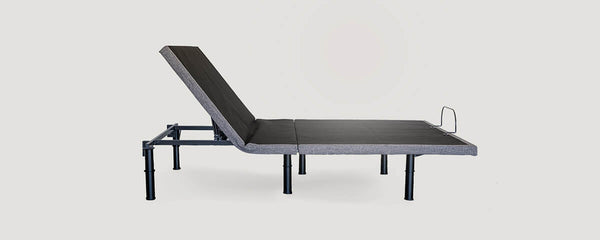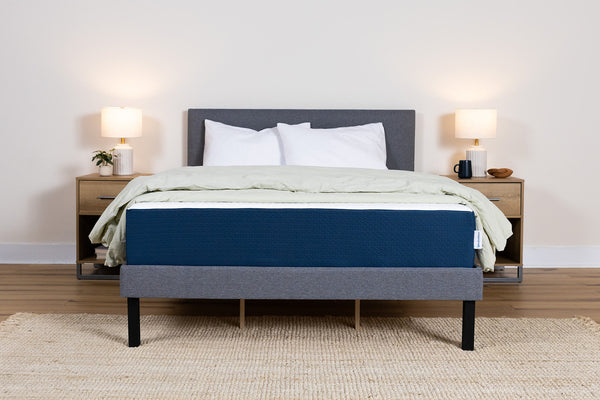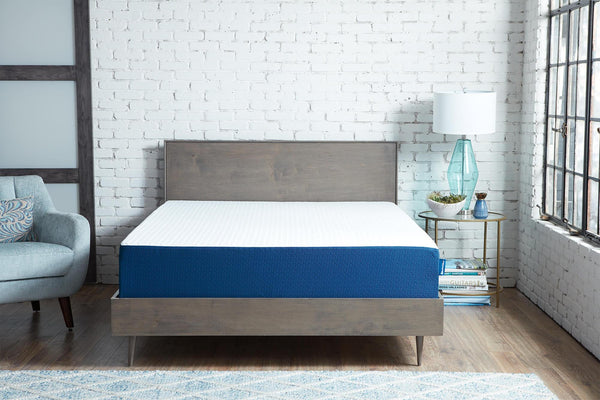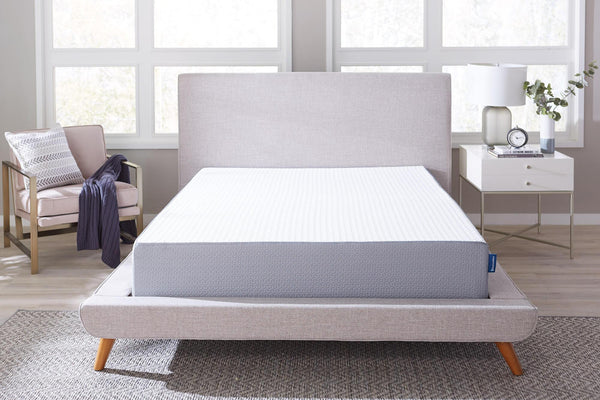Benefits of Sleeping Elevated

Contents
If you wake up feeling groggy, if you toss and turn at night due to discomfort, or if you suffer from any number of sleep disorders, it may be time to reevaluate your sleep setup. The way you are sleeping, or what you are sleeping on, could be preventing you from spending enough time in deep sleep, also known as stages 3 and 4 of the sleep cycle. Without substantial deep sleep, your body is not getting enough time to rest and recover before you wake fully. Studies have shown that a simple way to alleviate nighttime discomfort is to sleep with your upper body elevated, either with the help of a pillow or an adjustable bed frame. There are several benefits tied to sleeping elevated or sleeping on an adjustable bed frame, particularly for sleepers who struggle with common sleep issues, some of which we explore below.
Sleeping On an Incline
Elevated sleeping or inclined sleeping is sleeping in a position in which your upper body sits higher than it would in a normal, flat sleeping position. Not only can inclined sleeping elevate your head higher than your heart, but it can also elevate your entire sleeping experience by removing discomfort or obstructions that interfere with sound sleep. The various benefits that come with sleeping on an incline are achieved thanks to the assistance of gravity. For example, sleeping in a semi-recumbent position with the upper body tilted can decrease the severity of sleep apnea by opening up the airway. In fact, this sleeping position can help alleviate problems associated with the digestive, respiratory, and circulatory systems.
Benefits of the Elevated Sleep Position
Digestive System
When the upper body is elevated during sleep, gravity can pull stomach contents, such as food and acid, to a lower position to provide digestive relief. This can help mitigate stomach issues that usually get worse when lying flat, such as:
- Acid Reflux: Acid reflux is a burning sensation that can occur in the chest when your food or stomach acid travels back up your esophagus, also known as heartburn. Symptoms of acid reflux become more noticeable when you lie flat, especially after a large meal. By sleeping on an incline, gravity makes it more difficult for food and acid to travel back up your esophagus, minimizing acid reflux symptoms.
- Food Indigestion: Indigestion is stomach discomfort generally felt in your upper abdomen. If you sleep elevated, food will stay in your lower stomach rather than push against your upper stomach, thereby reducing stomach pressure or nausea sensation after eating.
- Nighttime Cough: Sleeping at an angle helps shield the throat from stomach acid, which reduces irritation and coughing that might keep you awake at night.
- Gastroesophageal Reflux Disease (GERD): Sleeping at an angle reduces the frequency and intensity of GERD symptoms at night by preventing stomach acid from going back into the esophagus.
For help with any of the above problems, medical specialists advise sleeping in an adjusted or raised position. For instance, raising your head can help with sinus congestion, acid reflux, and snoring reduction. Relieving pressure off the hips, elevating your legs, and bending your knees will help your mattress support the small of your back more efficiently and lessen lower back pain and stiffness.
Respiratory System
If you sleep with your upper body elevated, gravity helps pull down your upper airway to keep it open. At the same time, this elevated position also prevents your weaker throat muscles from collapsing and blocking your airway. Therefore, an incline position can enable easier breathing, which can help provide relief for the following conditions:
- Sleep Apnea: Sleep apnea is a common sleep disorder in which the soft tissue at the back of the throat collapses, or the tongue falls back and obstructs the airways which can cause pauses or interruptions in your breathing. However, sleeping in an upright position will help open your airway and prevent the inflicting obstructions that cause you to wake throughout the night.
- Mouth Breathing: Mouth breathing often occurs when an airway becomes obstructed. Breathing through your mouth can reduce oxygen absorption capacity in the lungs, which, in effect, shortens your breath. Sleeping at an incline will make it easier to breathe through your nose, which can also help with sleep apnea and snoring.
- Snoring: Sleeping at an angle helps minimize snoring because it keeps the airway open and keeps the throat's soft tissues from compressing and obstructing the airway.
- Chronic Obstructive Pulmonary Disease (COPD): By increasing airflow and lowering the risk of airway collapse as you sleep, sleeping can help reduce the symptoms of COPD.
Circulatory System
Sleeping elevated allows gravity to help circulate and drain the body’s fluids. Lying flat might otherwise enable these fluids to pool in certain areas of the body which can cause discomfort, pain, swelling, and even infection from fluid retention. Elevated sleep promotes gravity-assisted drainage which can help manage conditions such as:
- Post-Nasal Drip: Post-nasal drip occurs when mucus drips down the back of the throat which can cause coughing, the body’s way of clearing this obstruction, leaving you to wake up. Sleeping with the upper body upright can open up your airway to help stop this sensation.
- Migraine Pain: Lying flat on your back can increase pressure on your head causing oxygen levels to decrease and blood vessels to become restricted. However, an inclined position of about 30-40 degrees allows gravity to drain the fluid causing the pressure on your head. This greatly reduces the chance of waking up with a headache or migraine.
- Varicose Veins: Elevated sleeping aids in blood circulation improvement and vein pressure reduction, which helps lessen varicose vein pain and swelling.
- High Blood Pressure: By encouraging improved blood flow and circulation, sleeping at an elevated angle will help decrease the burden on your heart and may even assist in controlling high blood pressure.
Try a MotionInABox™ Adjustable Bed for Improved Sleep
MotionInABox® Adjustable Base 1.0
The MotionInABox® Adjustable Base 1.0 will improve your sleeping setup. This foundation relieves snoring and acid reflux during sleep thanks to its one-touch flat setting, full head and foot mobility, and the popular Zero Gravity position. With a wireless remote and two programmed presets for your preferred positions, you may personalize your comfort level. With prices starting at $636.75, it's the ideal way to improve the quality of your sleep.
MotionInABox® Adjustable Base 2.0
With the MotionInABox® Adjustable Base 2.0, sleep in luxury. For the best possible sleeping environment, its foundation features USB ports, underbed lights, massage settings, and silent drive motors. Its full head and foot adjustment helps with sleep disorders like GERD and sleep apnea. Use voice commands or a wireless remote to easily control your comfort. Upgrade your sleeping experience now!
| Health Benefit | Adjustable Bed Position |
|---|---|
| Improved Breathing | Elevating the head can open airways, reducing snoring and sleep apnea symptoms. |
| Reduced Acid Reflux | Sleeping with the upper body elevated prevents stomach acid from rising, decreasing acid reflux. |
| Decreased Swelling | Raising the legs can reduce fluid buildup in the lower extremities, alleviating swelling. |
| Enhanced Digestion | A slight elevation of the upper body aids digestion by preventing food from pressing on the stomach. |
| Back Pain Relief | Realigning your sleep position reduces pressure on the spine, alleviating lower back pain. |
| Better Circulation | Elevation improves blood flow, especially in the legs, supporting cardiovascular health. |
Complete your sleep setup with savings on mattresses, bundles, adjustable beds and other sleep accessories during our Holiday Sale.


